
A 2008 film by Kurosawa Kiyoshi
I’ll never forget the first time I was evaluated in graduate school. I was told that I asked good questions, but I wasn’t as ready or prepared to give good answers. A lot of suburban family dramas are the same way.
Like an aspiring student, suburban family dramas like to poke and needle at the establishment and status quo. These stories offer many insights into the dissolution of the nuclear family, the hollow existence of middle class life, the fall of patriarchal authority — just to name a few — but few of these movies resolve their conflicts. Often times, these stories descend into nothingness, wallowing in a pit of self-despair and existential crisis.
For a good two-thirds of its running length, Tokyo Sonata dances along this edge of no return, a Schwarzchild radius of nihilism, but what ultimately saves the movie from farce is its ability to look away. The movie poses questions but isn’t afraid to answer them. The answers may not be satisfying, but the movie doesn’t cop out. The movie never embraces nihilism.
Although the nuclear family has existed for centuries, common usage of the concept belongs firmly to the 20th century as nations began to modernize and industrialize. In post-war Japan, it was no different: a bread-winning father as a salaryman, a dedicated stay-at-home mother, and two perfect children. As time moved on, however, this model became increasingly difficult to sustain. Living costs spiraled ever higher and higher. Women were no longer content to play housekeepers. Youth discontent became a contemporary phenomenon. These and many other factors played into the continual erosion of the modern nuclear family.
The concept of the modern nuclear family nevertheless continues to represent an achievable dream, persisting and ingraining itself into the minds of many. Individuals strive in a Sisyphean effort to attain and preserve their image of the ideal family. Thus, when these individuals often fail despite factors completely out of their control, the inability to achieve paradise leads many to utter despair. Tokyo Sonata focuses on the Sasaki family’s struggles with these exact problems.
The economic recession calls for cutbacks and downsizing among many Japanese companies. Sasaki Ryuhei becomes the latest victim of a corporate world where the bottom line is always money. As the patriarch and designated bread-winner of his family, pride and shame consumes Ryuhei. He is unable to tell his wife that he has lost his job. Ryuhei rejects his youngest son’s proposal to learn the piano on a whim rather than admitting that he can’t afford the piano lessons. He is also too prideful to accept blue collar jobs, wearing his suit daily with pride. Ryuhei even pretends to answer his cellphone just to maintain his image.

Ryuhei at what appears to be an unemployment agency
Ryuhei bottles his impotence within him until it manifests itself in massive displays of anger. He beats his son when his son takes piano lessons behind his back. Ryuhei screams with rage when yet another job interview yields nothing but rejection and embarrassment. Ryuhei represents the fall of traditional patriarchal authority.
Megumi plays Ryuhei’s quiet wife. Her despair is similar to those of many women in her position. Trapped by the daily chores of cleaning, vacuuming, and cooking, she longingly stares at a red convertible one day, a symbol of her unrealized freedom.
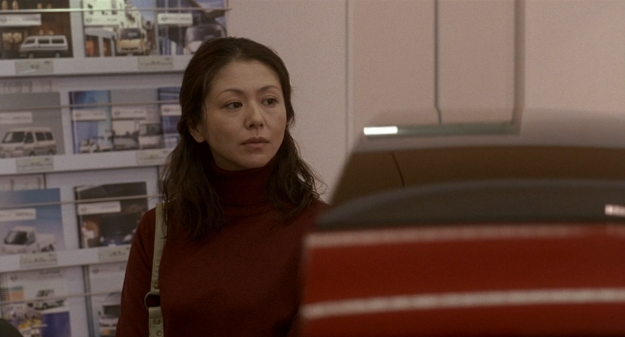
Megumi at a car showroom
The car’s ability to shape-shift represents change, an idea all too uncommon in her life. When Megumi discovers her husband lining up for free food from afar, she stays quiet. It is only when Ryuhei throws her younger son down a flight of stairs that she feels the need to escape her prison of domesticity.
Sasaki Takashi, the older son, represents the dichotomy between older and younger Japanese generations. He’s rarely home, choosing instead to prowl the streets at night. Takashi is desperate to forge his own path through life, which leads him to enlist in the American army despite being a Japanese citizen. Against his parents’ protests (moreso from Ryuhei than Megumi), Takashi’s despair is one of ideology facing many young adults. Takashi, like his father, is frustrated by impotence, symbolized here by Japan’s inability to defend itself with a standing army.
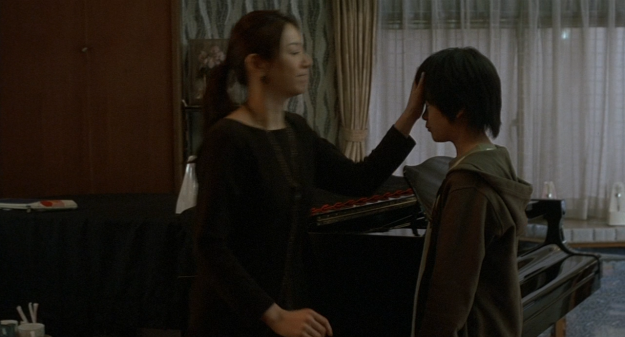
Like everyone else, Kenji’s tutor treats him like a child
Sasaki Kenji, the younger son, is all too ready to leave childhood behind, often finding himself unable to socialize with many of his peers. In spite of this, he isn’t quite ready to endure adulthood either. Kenji awkwardly attempts to form a connection with his piano teacher only to be rejected. Feeling alienated from all sides, Kenji attempts to run away from home after suffering a beating from his father.
What establishes the rising tension in a drama like Tokyo Sonata is the unraveling of secrets. Ryuhei hides the fact that he is unemployed due to his pride as a bread-winning father. Megumi hides the fact that she knows Ryuhei’s secret, afraid of undermining his authority. Kenji hides the fact that he’s taking piano lessons behind his father’s back. These intertwining threads loop around each other for the first hour of the movie until we move perilously close to the multiple revelations — the moment that the delicate house of cards fall down around our unsuspecting family.
The moment inevitably arrive and the nuclear family dissolves. At this point, the movie could have easily taken the easy way out, the path often taken by like-minded movies. Embracing nihilism once and for all, a major death in the family often marks the end of similar stories. This is where Tokyo Sonata deviates, shifting from a placid, solemn family drama to nearly a black comedy as each family member spend a night alone, disconnected from each other as a family.
Two other men figure prominently in Tokyo Sonata. Kuruso, a former school chum of Ryuhei, at first plays the part of Ryuhei’s mentor, teaching Ryuhei how to maintain the image of a self-important salaryman. Kuruso eventually enlists the aid of Ryuhei to play the part of a co-worker. He invites Ryuhei to his home to convince his wife that everything is okay. During an awkward dinner, Kuruso concocts a lie to make himself appear superior to Ryuhei, but Kuruso is unable to realize that his wife is more perceptive than she lets on. One day, Kuruso no longer appears at the park he and Ryuhei often tramp. When Ryuhei investigates into his friend’s whereabouts, he learns that Kuruso forced his wife into committing double suicide, leaving their young daughter behind to fend for herself.
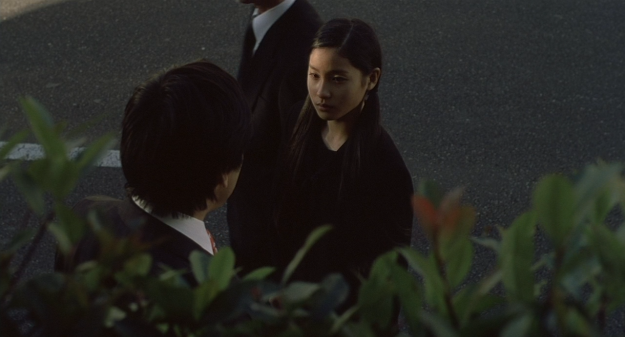
Kuruso’s daughter
The other man, a robber who is never given a name within the movie, lives a life of complete desperation. He breaks into Ryuhei’s home one day to steal money only to find nothing. He then takes Megumi hostage before succumbing to his own despair and committing suicide by the movie’s end.
Both men are important to Ryuhei although he never meets the latter. In Kuruso, Ryuhei sees a father who would choose the death of his family over any admission and acceptance of failure as a patriarch. In the robber, desperation leads to absolute chaos and destruction. When Ryuhei finds a folder full of cash while working as a janitor, he contemplates keeping the money for himself. Like the robber, however, taking the money would only come at the expense of another human being. Either men thus represent nihilism, a nihilism that Ryuhei stares into and ultimately rejects. When Ryuhei trips and falls into a pile of garbage, he sobs and cries out, “How can I… start all over again. I want to start again. I want to start again.” So unlike Kuruso, Ryuhei swallows his pride and chooses his family instead. Unlike the robber, Ryuhei gives up the pile of money to a ‘Lost and Found’ bin, choosing instead to be lawful in spite of his hardships. In essence, Ryuhei chooses life over nihilism. Tokyo Sonata‘s answer is thus courage — the courage to struggle against life even when death is easy to embrace.
Like Ryuhei, the mother and younger son each embark on a journey of self-discovery. Megumi attempts to run away with the robber, spending much of her time away from home staring off into the horizon. For her, the endless expanse of the horizon represents the distant, faded possibilities her life could have taken — possibilities she gave up to be a housewife: “Is that land over there? Or a boat?” To Megumi’s new partner, however, he is too utterly consumed by chaos: “I can’t see. I can’t see a thing!”
At night, Megumi confesses to the man that “How wonderful it would be if my whole life so far… turns out to have been a dream… and I suddenly wake up and I’m someone else entirely. You’re the only person who can be you. That’s all we have to hold onto.” She continues to wander along the shores again, this time greeted by nothing but a dark emptiness broken only by the rolling waves of the ocean. Like the robber, Megumi can no longer “see a thing” and she breaks down and cries alone on the beach. She discovers the following morning that the robber missing along with his stolen car; the tracks lead ominously into the sea. Megumi wanders along the shore again without any word or expression until the light of dawn radiates across her face.
Kenji, lost between childhood and adulthood, also attempts to escape suburbia. Running away from home, however, proves to be more difficult than it seems. Kenji soon finds himself arrested and charged as an adult. Although it was only a petty crime, Kenji had to spend a night amongst strangers in a crowded police cell. During this ordeal, Kenji comes to the realization that he can’t yet survive on his own.
The mother’s journey is perhaps the most quizzical in the movie. The father realizes that he can be a capable father even if he isn’t a well-respected salaryman. Kenji understands that he’s not as ready for adulthood as he once thought. What, however, did Megumi realize that morning on the beach? All we see is the light upon her face before she decides to return home and proceeds to cook a meal for her family. Maybe Megumi decided to stop looking at what could have been, choosing instead to embrace the present. This would be consistent with the movie’s overarching theme to reject nihilism. In the end, however, something feels unsatisfying about her conclusion. There are no indications at the end of the movie that Megumi’s life has changed in any significant way.
Ryuhei, Megumi and Kenji return to the dining room, the site where the family slowly fell apart and where the family will begin again anew. They sit down to a meal, accepting their new lives. The movie jumps forward by four month. We see that Ryuhei is still a janitor. Megumi reads a letter from Takashi, who resolves to find true happiness in his military trips abroad. The film finally closes with a piano recital by Kenji with his parents in attendance.
Stray Observations
• The scene where Megumi and the robber stands before the open sea (seen below) is a familiar image in Japanese stories.
To name one example, here’s a similar shot from Madhouse’s adaptation of No Longer Human:
In both stories, the sea represents the possibility of change or rebirth to the women. Suicide exists as a dark undercurrent in both Tokyo Sonata and No Longer Human although Megumi ultimately decides to return to her family in the end.
• The heartbeat of the movie occurs within the dining room, where the family members share their meals. It is here that the family secrets are revealed, where the altercations occur, and ultimately, where the family changes.
The framing of these scenes are thus fascinating. The camera is always positioned as if the viewer is a member of the household.
A third child, perhaps, watching from the shadows, behind the railings of the stairs, or the leaves of a potted plant as his or her family slowly falls apart before them.
• The oppression of tradition and pride permeates the entire movie, but it is most easily remembered in a subtly comedic scene involving Ryuhei learning his ropes as a janitor.
Ryuhei’s boss gives him four different cleaners for four different surfaces, then adds that the fifth bottle can be used as an all-purpose cleaner. Ryuhei naturally asks, “Can’t I just clean everything with [the all-purpose cleaner]?” to which his boss replies, “No. It’s not professional.”
• Kagawa Teruyuki, who plays Ryuhei, kinda looks like Kevin Spacey.
I only mention this because Kevin Spacey was in American Beauty, another movie also about suburban family life.
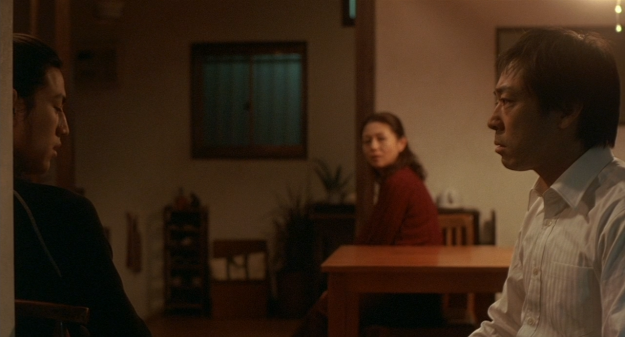
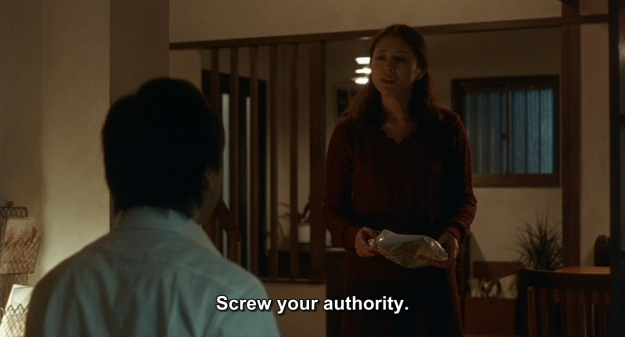

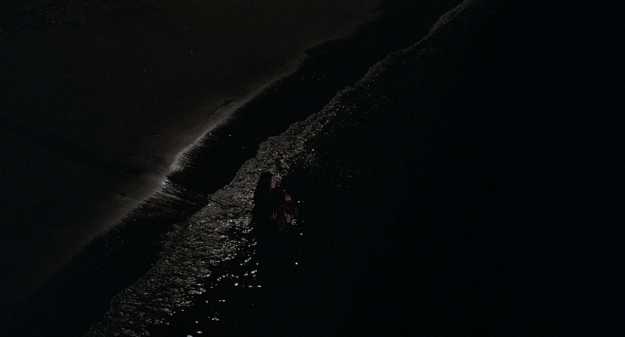
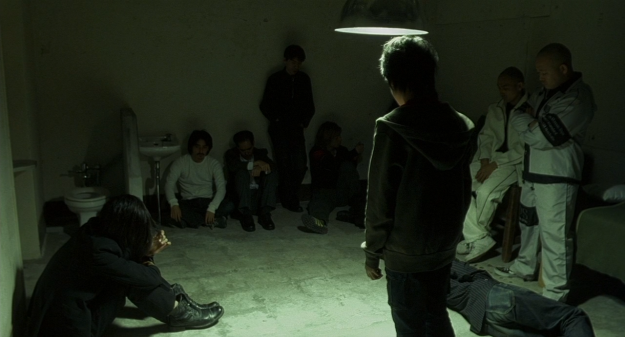

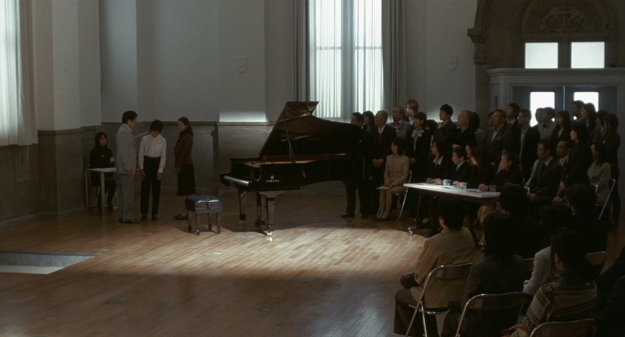
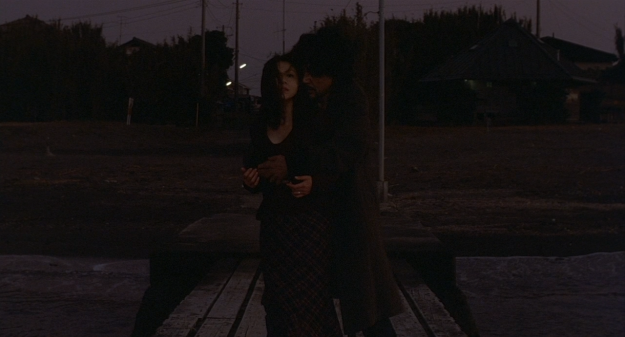

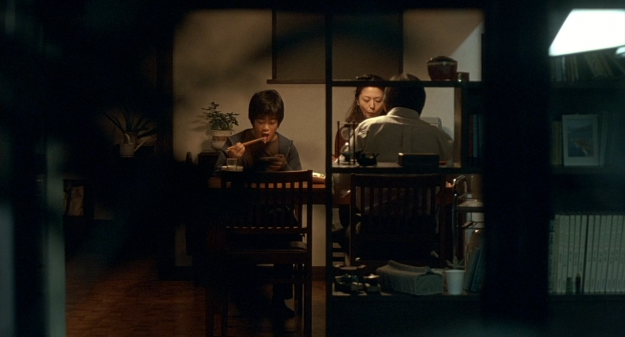
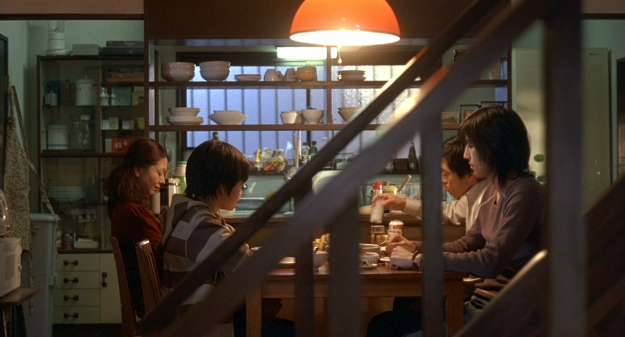


One of the interesting things about this film is that Kiyoshi Kurosawa is a director well-known for his psychological/horror films, and with Tokyo Sonata it’s often remarked that he managed to transfer that aesthetic to what is ostensibly a ‘family drama’ (often in reference to the dinner table scenes.) I’ve seen this film twice now and kind of feel the same way about those observations, but both times found it hard not to be distracted by the dramatic sweep! It’s a really good film (and quite depressing, too,) so it’s great to see a positive review of it here. I really recommend Kurosawa’s film Cure (I swear Shutter Island was influenced by Kurosawa’s style in this) if you’re up for something dark and disturbing!
Also, keep up with the reviews of the Japanese cinema. Great suff! :)
I’m a big fan of the director so I’ve already seen Cure and other movies like Kairo (a shame what Hollywood did to the latter). I really wish he was more popular so I could see some of his older films. Normally, you mention Kurosawa and people think of Akira Kurosawa instead of Kiyoshi (the former definitely deserves the reputation, of course).
I didn’t find Tokyo Sonata as depressing as I expected it to be. I actually found the ending rather uplifting for a movie of its type, which motivated me to write this post. As for Kurosawa translating his horror chops to the family drama genre, I did consider at first that the framing of the dinner scenes were rather voyeuristic, as if the observer was a murderer spying on the family. Considering the family feel though, I opted for a different interpretation — not that there’s a single right interpretation.
Yeah, the ending is a relief after what came before, I guess it’s just a bit depressing if you seperate what it’s (almost episodically) depicting from the narrative: a whole generation of ‘office jockey’ adults with no real practical skills. It’s horrible when Ryuhei goes for that job interview and they ask, “so, what can you do?” and all he can suggest is karaoke. The whole episode with him pretending to go to work is horrible, too. I don’t know how realistic that was, but yeah, depressing none-the-less. Basically, I wouldn’t recommend this film to hopeful young university graduates with vague degrees in ‘communication’ or whatever!
As for Kiyoshi Kurosawa, I’m glad to have found a kindred spirit! Which of his post-Cure films would you recommend? I’ve already seen Pulse (loved it) and Charisma (absolutely fricking weird,) but it’s hard to know where to start with the others.
I had a slightly different take on the karaoke interview, especially considering Ryuhei’s reaction to his failure in the following scene. For someone desperate for an administrative position, Ryuhei fails to display any sort of energy, confidence, and quick thinking — qualities you expect in the business world. He stands before the interviewers like a meek and timid titmouse. This scene is thus a microcosm of an older generation’s inability to adapt to a younger, more dynamic business world, to take initiative and display leadership qualities. Practical skills can be taught; attitude, on the other hand, depends solely on the person and Ryuhei channels his passion in all the wrong places. When he was raging in the streets after the interview, I could only say to myself, “Dude, why didn’t you show this sort of passion in the interview?” It’s thus necessary for him to “start over,” even if it means starting at the bottom of the food chain. He needs to show passion in his work even if it means wiping shit off a toilet seat to provide for his family — at least it’s something.
As for Kiyoshi Kurosawa films, Bright Future is a perfect movie to bring up in relation to Tokyo Sonata. A bit weirder, but it very much deals with generational gaps and how older generations can be set in their ways.